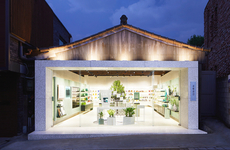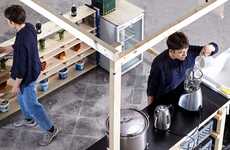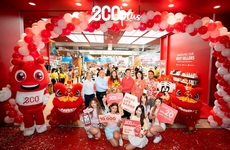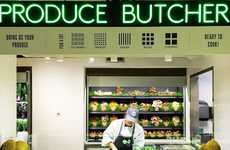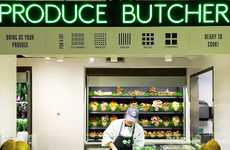
Fukushimaya Supermarket Was Made from ZAM Pipes and Wine Crates
Ellen Smith — June 21, 2017 — Art & Design
References: japan-local-guide & designboom
The vibrant Fukushimaya Supermarket in Tokyo maintains a minimalist aesthetic while ensuring the products remain at the center of attention. Thoughtfully made using low-cost materials like ZAM pipes, prefabricated shopping carts, wood wine boxes and more, this grocery store is both vivid and sustainable. The store, which has been opened for 30 years, has built the trust of its surrounding neighbors, always offering fresh produce, and catering to a more urban clientele. The bright and industrial design of the store now successfully mirrors the attitudes of the people who shop there: young, urban business professionals.
The now easy to navigate store was made possible through the cleverly constructed ZAM pipes which create a grid-like system, maintaining organization and reflecting the high-quality products that can be found at a low cost.
Photo Credits: designboom, japan-local-guide
The now easy to navigate store was made possible through the cleverly constructed ZAM pipes which create a grid-like system, maintaining organization and reflecting the high-quality products that can be found at a low cost.
Photo Credits: designboom, japan-local-guide
Trend Themes
1. Sustainable Grocery Stores - There is an opportunity for the development of more sustainable and eco-friendly grocery stores that attracts young urban professionals.
2. Minimalist Retail Design - There is a trend towards using minimalist retail design and low-cost but innovative materials to create a unique shopping experience that caters to a younger demographic.
3. Organic and Affordable - There is a growing trend towards the provision of fresh organic and healthy food at affordable prices that caters to an urban clientele.
Industry Implications
1. Retail - Retailers can adopt a minimalist approach to retail design and use low-cost materials such as ZAM pipes to create a unique shopping experience that caters to the needs of young urban professionals.
2. Sustainable Manufacturing - Manufacturers can explore the use of eco-friendly and sustainable materials that are both cost-effective and aesthetically appealing in the construction of grocery stores and other retail environments.
3. Organic Food Production - Organic food producers can partner with retailers to provide fresh and healthy produce at affordable prices through sustainable farming practices that meet the needs of an urban clientele.
5.2
Score
Popularity
Activity
Freshness


